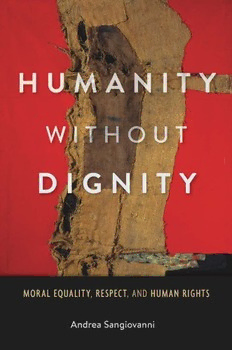
Humanity without dignity: moral equality, respect, and human rights PDF
Preview Humanity without dignity: moral equality, respect, and human rights
HUMANITY WITHOUT DIGNITY Humanity Dignity without Moral Equality, Respect, and Human Rights AndreA SAngiovAnni Cambridge, Massachusetts & London, England 2017 per i cicci Copyright © 2017 by the President and Fellows of Harvard College All rights reserved Printed in the United States of Amer i ca First printing Library of Congress Cataloging- in- Publication Data Names: Sangiovanni, Andrea, author. Title: Humanity without dignity : moral equality, re spect, and human rights / Andrea Sangiovanni. Description: Cambridge, Mas sa chu setts : Harvard University Press, 2017. | Includes bibliographical references and index. Identifiers: LCCN 2016046030 | ISBN 9780674049215 (alk. paper) Subjects: LCSH: Equality— Philosophy. | Human rights— Philosophy. | Dignity— Philosophy. Classification: LCC HM821 .S17 2017 | DDC 305— dc23 LC rec ord available at https:// lccn. loc. gov /2 016046030 Cover art: Sacking and Red, 1954, Alberto Burri (1915-1995). © Fondazione Palazzo Albizzini Collezione Burri, Città di Castello (Perugia) / DACS 2016. Photograph © Tate, London 2016. Cover design by Lisa Roberts CONTENTS Preface ix Introduction 1 Guide for the Reader • 6 A Note on Methodology • 7 PART I. FOUNDATIONS 1 Against Dignity 13 Desiderata • 14 The Aristocratic Tradition • 16 The Christian Tradition • 27 The Kantian Tradition • 36 The Regress Reading • 37 The Address Reading • 50 The Distinction between Basic Moral Status and Equal Moral Status • 60 vi Contents 2 Moral Equality, Re spect, and Cruelty 72 Treating as Inferior • 73 Cruelty • 75 Res pect • 86 Consent • 99 Variation and Status • 100 Punishment • 110 Conclusion • 112 3 When and Why Is Discrimination Wrong? 113 The Concept of Discrimination • 116 Discrimination and Social Meanings • 120 Demeaning and Disrespecting • 129 A Fresh Start: The Expressive Harm Account • 131 Stigma and Dehumanization in Racial Discrimination • 133 Reverse Discrimination • 138 Infantilization, Objectification, and Instrumentalization in Sex Discrimination • 139 Infantilization • 140 Objectification and Instrumentalization • 149 Indirect Discrimination • 160 PART II. HUMAN RIGHTS 4 The Concept of Human Rights: The Broad View 177 Desiderata • 178 Against Orthodox Views • 180 Against Po liti cal Views • 186 A Merely Verbal Disagreement • 190 The Broad View • 191 The Concept • 191 The Diversity That Stands between Concept and Conception • 194 Avoiding Merely Verbal Disagreement • 200 How Does the CSBV Help to Satisfy the Four Desiderata? • 203 The Subclass Desideratum • 203 The Fidelity Desideratum • 203 Contents vii The Normativity and Determinacy Desiderata • 205 Conclusion • 205 5 International Legal Human Rights and Equal Moral Status 207 A Defense of the Grounding View • 212 The Obligation to Establish and Maintain an International Legal Human Rights System • 220 The Duty of Reciprocal Protection and International Legal Human Rights • 229 Looking Ahead • 233 6 Fundamental Rights, Indivisibility, and Hierarchy among Human Rights 235 Basic Rights • 235 Fundamental Rights • 240 Indivisibility and Hierarchy among Human Rights • 246 Notes 257 References 289 Index 303 PREFACE “Humanity” has two sets of meanings. The first refers to the h uman race, or to t hose attributes that make us, as h uman beings, distinctive. The second refers to a virtue—a cting with humanity.1 This book argues that to understand our commitment to moral equality, we must seek an account of humanity as a virtue rather than as a property. We treat each other as moral equals, I claim, when we treat each other with hu- manity. On this view, treating another as inferior is wrong when and because it is inhuman, a kind of cruelty, rather than b ecause it over- looks a special worth, or dignity, that, like “a jewel . . . shines by itself.”2 We re spect another’s equal moral status not when we bow before their capacity to choose in accordance with reason, but when we recognize the vulnerability to which they are subject as beings who must, as Rousseau remarks, “live in the eyes of others.”3 I have spent many years thinking through t hese issues. I am not sure I have gotten them right, but I have many people to thank for preventing me from going too far astray, and who have, along the way, given me not only invaluable advice and criticism but also encouragement and warmth. I would like to thank Chuck Beitz, Duncan Bell, Colin Bird, Jude Browne, Ian Car ter, Emanuela Ceva, Rowan Cruft, Sylvie Delacroix, Tom Dough- erty, Daniel Elstein, Sarah Fine, Miranda Fricker, Pablo Gilabert, Ulrike
